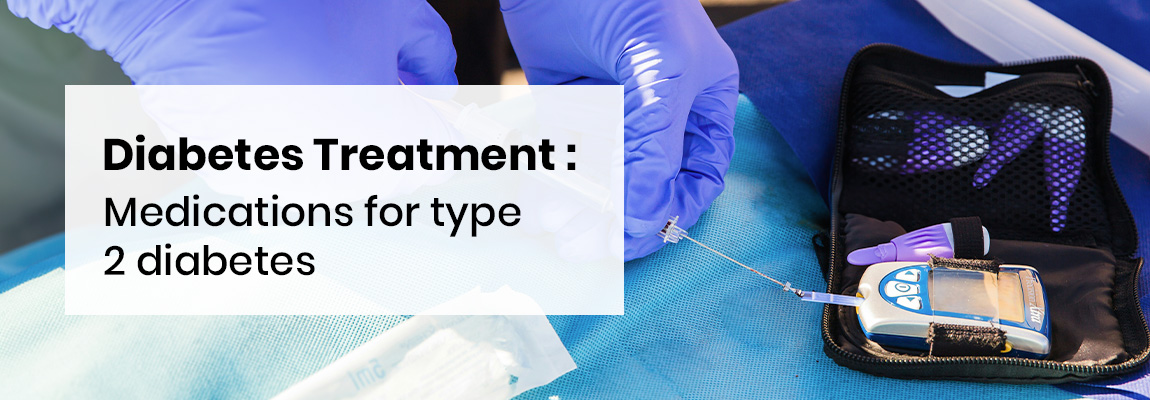
Diabetes is a health condition that is persistent or has a long-duration effect. It affects how the human body turns food into energy. It can lead to serious damage to the heart, kidneys, nerves, and more. There are primarily two types of diabetes: Type 1 and Type 2.
In this blog, we will talk about Type 2 Diabetes and how to treat it.
Type 2 Diabetes
Type 2 is actually common in adults. It occurs when the body becomes resistant to insulin or doesn’t make enough insulin to maintain regular blood sugar levels and keep the body functioning properly. When too much sugar (glucose) is circulated in the blood for a long time, it results in Diabetes. This long-term condition can be critical if not taken care of.
Symptoms Of Type 2 Diabetes
In most cases, symptoms of this condition develop slowly. Some people don’t get any signs or symptoms, and some don’t notice them. The first warning signs of Type 2 Diabetes are pretty noticeable.
- Needing to urinate more, especially at night.
- The slow healing process of any wound.
- Feeling more thirsty.
- Low hearing with time.
- Blurred vision.
- Weight loss.
- Lack of energy in the body.
Diagnosis Of Type 2 Diabetes
Type 2 diabetes can be diagnosed using The Glycated Hemoglobin (A1C) test, which measures a person’s blood glucose level. It shows an average of the blood sugar level over the past 90 days or so.
- A1C below 5.7% is considered as normal
- 5.7% to 6.4% is diagnosed as prediabetes
- 6.5% or higher indicates diabetes
If your results tell you that you have type 2 diabetes, talk with your doctor about the detailed treatment plan and the things you should do to be healthier.
Complications
If you are diagnosed with Type 2 Diabetes, you should start your diabetes treatment. If you don’t start medications and change certain living habits, it can cause life-threatening complications. Some of the complications include:
1- Heart Disease and Stroke
Type 2 Diabetes causes high blood glucose which results in damaging blood vessels and nerves that control the heart and blood vessels. This damage can lead to heart disease and stroke.
2- Nerve Damage
High blood sugar levels damage the small blood vessels that supply the nerves in the body. This causes numbness, tingling, and burning sensations, as well as muscle cramps in the hands or feet. If left untreated, the condition can spread to the legs or arms.
3- Kidney Problem
The kidneys are made up of tiny units called nephrons. High blood sugar from diabetes can damage the nephrons and blood vessels in the kidneys, preventing them from working as they should. Diabetes also causes high blood pressure, which can cause kidney damage too.
4- Eye Issues
Diabetes can cause damage to the eyes that can lead to blurred vision and even blindness. High sugar levels can change fluid levels or cause swelling in the tissues of the eyes that help you focus.
Reducing the Complications
Yes, you heard it right! You are eligible to reduce the long-term effects of diabetes and significantly lessen complications; you just have to take care of your eating habits, lifestyle, and medications.
1- Food Habits: Firstly, you have to focus on healthy eating because what goes in your body affects your life a lot. The kind of foods you need to focus on before preparing your meal:
- High-fiber foods such as non-starchy vegetables, fruits, and whole grains.
- Avoid having foods with fat.
- Use healthy cooking oil like olive oil, with less amount
- Eat less Calories Food
2- Healthy Lifestyle: Physical exercises are important to maintaining weight. It gives strength to the body and maintains its health. Activities that help in controlling diabetes:
- A 25-30-minute walk every day may help your health.
- A combination of aerobic and resistance training may be an effective form of exercise.
3- Medication: You might know that medication for type 2 diabetes is really important for the patients to survive.
- Seek doctor’s advice and medication when you are diagnosed with type 2 diabetes.
- Insulin injections that are recommended by your doctor are important.
Regular Checkups
Monitoring your health and regular checkups are necessary if you are diagnosed with type 2 diabetes. Your doctor will advise you to check your blood sugar once a day or so to make sure you are in the targeted range.
Checking regularly helps prevent sudden medical conditions. Monitoring your sugar level can be done at home with a small device called Blood Glucose Meter.
Get Help At Chermside Specialist
People who are living with diabetes know how crucial affordable treatment and insulin are for their survival. This is why we provide affordable treatment with a specialized doctor team. We are committed to providing expert care to patients with diabetes.
Always remember to reach out to the doctors when you notice the symptoms or are diagnosed with diabetes. You don’t have to manage it on your own, experts can help you with the treatment. We offer the treatment of type 2 diabetes with our experienced team, which carefully analyzes the patient’s health and needs.